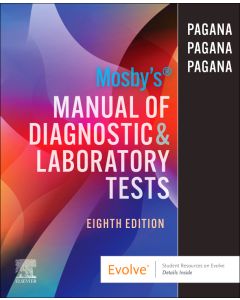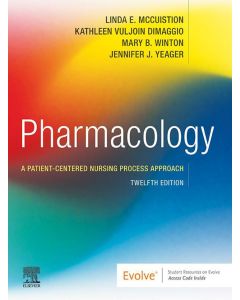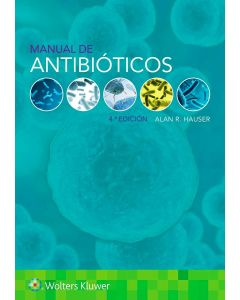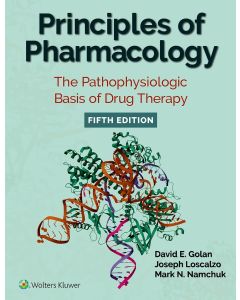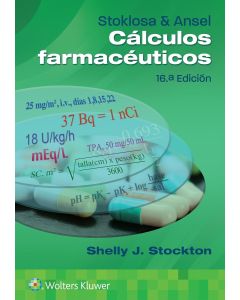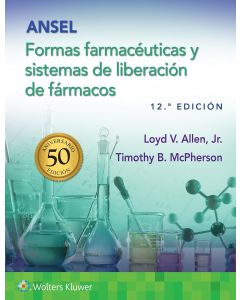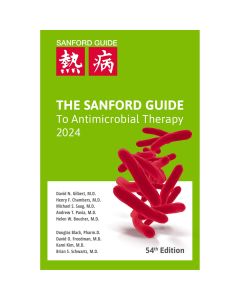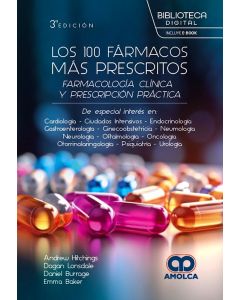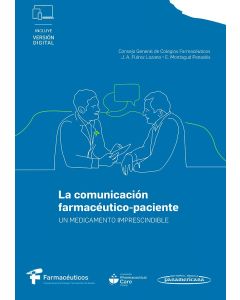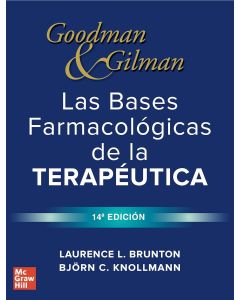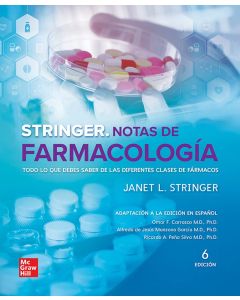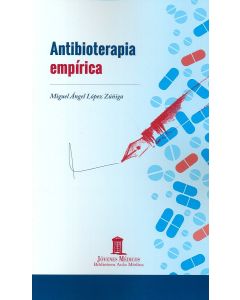Brody's Human Pharmacology
Incluye Gastos de Importación
-
Especialidad
- Farmacología y Toxicología
- Farmacia
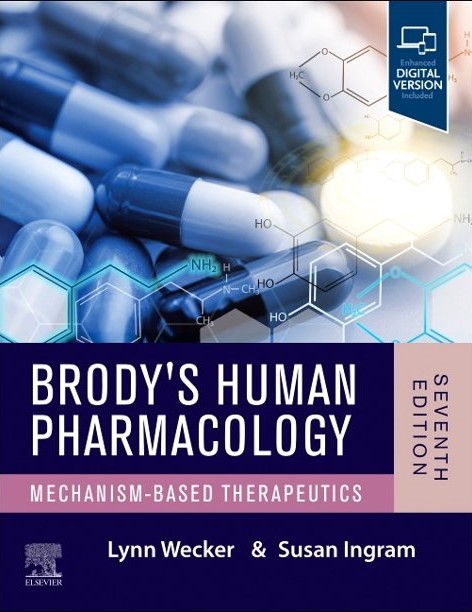
Section 1 Mechanisms of Drug Action and Therapeutic Principles
1. Introduction, Terminology
Lynn Wecker
2. Pharmacodynamics: Drug Targets (Receptors, Enzymes, DNA, etc)
James Carlton Garrison II
3. Pharmacokinetics
Paul Hollenberg
4. Pharmacogenomics
Julie A. Johnson, Larisa Cavallari and Scott Mosley
5. Drug Development and Regulation
James Barrett
Section 2 Chemical Mediators and Drugs Affecting Autonomic and Neuromuscular Synapses
6. Introduction to the Peripheral Nervous Systems and Drugs for Peripheral Disorders
Robert James Theobald Jr.
Cholinergic Drugs
7. Muscarinic Agonists and Their Clinical Uses
Frederick Ehlert
8. Muscarinic Antagonists and Their Clinical Uses
Frederick Ehlert
9. Nicotinic Agonists and Their Clinical Uses
Robert James Theobald Jr. and Lynn Wecker
10. Nicotinic Antagonists and Neuromuscular Blocking Drugs
Robert James Theobald Jr. and Lynn Wecker
Adrenergic Drugs
11. Adrenergic Agonists and Their Clinical Uses
Javier Cuevas
12. Adrenergic Antagonists and Their Clinical Uses
Javier Cuevas
Section 3 Drug Treatment for Disorders Affecting the Central Nervous System
13. Introduction to the CNS and Drugs Affecting the Brain
Lynn Wecker
Neurodegenerative Disorders
14. Drug Therapy for Alzheimer's Disease and Other Cognitive Disorders/Dementias
Steven Trent DeKosky, Meredith Wicklund and Michael Jaffee
15. Pharmacotherapy of Basal Ganglia Disorders: Parkinson's Disease and Huntington's Disease
Juan R. Sanchez-Ramos and Briony Catlow
16. Drug Therapy for Psychoses and Bipolar Disorder
Lynn Wecker, Glenn Courrier and Glenn catalano
17. Drug Therapy for Depression and Anxiety
Lynn Wecker, Glenn Courrier and Glenn catalano
18. Stimulants and Drug Therapy for the Management of ADHD
Samba Reddy
19. Drug Therapy for Insomnia and the Hypersomnias
Lynn Wecker
20. Drug Therapy for Managing Obesity and Eating Disorders
Charles Rudick
21. Drug Therapy to Control Seizure Disorders
Michael Rogawski
22. Drug Therapy to Control Spasticity Disorders
Michael Saulino
23. Ethanol, Ethanol Dependence and Drug Therapy
Charles Whitmore and christian Hopfer
24. Other Drugs of Abuse, Addiction and Drug Therapy
Rex Philpot and Peter Kalivas
Section 4 Drug Therapy for Pain Management
25. Introduction
Susan L. Ingram
26. General Anesthetics
Jeffrey J. Pasternak and David Wetzel
27. Local Anesthetics
Joshua Edwards
28. Opioid Analgesics
Susan L. Ingram and Elena Bagley
29. Nonsteroidal Anti-inflammatory Agents and Acetaminophen
Jennelle Durnett Richardson and Jill Fehrenbacher
30. Cannabinoids
Gregory Lee Gerdeman
31. Drug Therapy for Headache
Samba Reddy
Section 5 Treatment of Inflammatory, Allergic and Immunologic Disorders
32. Drug Therapy for Rheumatoid Arthritis
Keith Elmslie
33. Drug Therapy for Gout and Hyperuricemia
Keith Elmslie
34. Histamine and Antihistamines
Kirk Dineley and Latha Malaiyandi
35. Immunosuppressants for Organ Rejection and Autoimmune Disorders
Kymberly Gowdy
Section 6 Drug Treatment for Cardiovascular Diseases
36. Introduction to The Cardiovascular System and the Regulation of Blood Pressure and Heart Rate
David A. Taylor and Abdel A. Abdel-Rahman
37. Diuretics and Drugs that Affect Volume and Electrolyte Content
Abdel A. Abdel-Rahman
38. Drugs Affecting the Renin-Angiotensin-Aldosterone System
Abdel A. Abdel-Rahman
39. Calcium Channel Blockers
Kelly Karpa
40. Vasodilators
David Anthony Tulis
41. Other Antihypertensive Drugs Acting via the Peripheral or Central Nervous Systems
David A. Taylor and Abdel A. Abdel-Rahman
42. Sodium Channel Blockers and Other Antiarrhythmic Agents
David A. Taylor
43. Treatment of Heart Failure: Cardiac Glycosides, Phosphodiesterase Inhibitors and Other Agents
Michael T. Piascik and Robert Hadley
44. Drug Therapy for Hyperlipidemias and Atherosclerotic Cardiovascular Disease
Michael T. Piascik and Robert Hadley
45. Anticoagulant, Antiplatelet and Thrombolytic Agents
Kent Vrana and Frank Herman
46. Drug Therapy for Myocardial Ischemia and Angina Pectoris
Joseph West Paul Jr.
47. Drug Therapy for Hemophilia and the Anemias
David A. Taylor
Section 7 Treatment of Endocrine Disorders
48. Introduction to Endocrine Pharmacology
Shelley Tischkau
49. Treatment of Hypothalamic and Pituitary Disorders
Shelley Tischkau
50. Treatment of Adrenalcorticosteroid Disorders
Gerald B. Call
51. Drug Therapy for the Management of Diabetes
Julio A. Copello
52. Drug Therapy for the Management of Thyroid Disorders
Shelley Tischkau
53. Calcium Regulating Hormones and Agents Affecting Bone
Jack W. Strandhoy
54. Female Hormones, Birth Control, Infertility and Drugs Affecting Uterine Function
Julia Ousterhout
55. Male Hormones and Drugs for the Treatment of Erectile Dysfunction and Benign Prostastic Hyperplasia
David Middlemas
Section 8 Chemotherapy
Infectious Diseases
56. Principles of Antimicrobial Use
Rukiyah Van Dross
57. Bacterial Cell Wall Synthesis Inhibitors
Rukiyah Van Dross
58. Inhibitors of Protein Synthesis
Rukiyah Van Dross
59. Drugs that Target DNA

